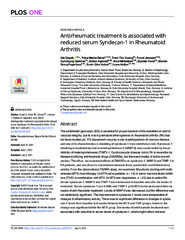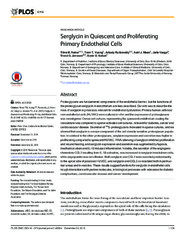Blar i forfatter "Kolset, Svein Olav"
-
Antirheumatic treatment is associated with reduced serum Syndecan-1 in Rheumatoid Arthritis
Deyab, Gia; Reine, Trine M.; Vuong, Tram Thu; Jenssen, Trond Geir; Hjeltnes, Gunnbjørg; Agewall, Stefan; Mikkelsen, Knut; Førre, Øystein; Fagerland, Morten; Kolset, Svein Olav; Hollan, Ivana (Journal article; Tidsskriftartikkel; Peer reviewed, 2021-07-09)The endothelial glycocalyx (EG) is essential for proper function of the endothelium and for vascular integrity, but its role in premature atherogenesis in rheumatoid arthritis (RA) has not been studied yet. EG impairment can play a role in pathogenesis of vascular disease, and one of its characteristics is shedding of syndecan-1 from endothelial cells. Syndecan-1 shedding is mediated by matrix ... -
Glucosamine exposure reduces proteoglycan synthesis in primary human endothelial cells in vitro
Reine, Trine M.; Jenssen, Trond Geir; Kolset, Svein Olav (Journal article; Tidsskriftartikkel; Peer reviewed, 2016-09-23)<b>Purpose:</b> Glucosamine (GlcN) supplements are promoted for medical reasons, for example, for patients with arthritis and other joint-related diseases. Oral intake of GlcN is followed by uptake in the intestine, transport in the circulation and thereafter delivery to chondrocytes. Here, it is postulated to have an effect on synthesis and turnover of extracellular matrix constituents expressed ... -
Matrix metalloproteinase-9 mediated shedding of syndecan-4 in glomerular endothelial cells
Reine, Trine M.; Lanzalaco, Francesca; Kristiansen, Oddrun; Enget, Anne Randi; Satchell, Simon; Jenssen, Trond Geir; Kolset, Svein Olav (Journal article; Tidsskriftartikkel; Peer reviewed, 2019-01-31)<p><i>Background - </i>Diabetic nephropathy is the most common cause of end‐stage renal failure in the western world and Asia. The mechanisms are not fully elucidated, but disruption of glomerular endothelial glycocalyx and shedding of its components including syndecans has been implicated. <p><i>Aims - </i>We hypothesize that reduced glomerular filtration in diabetes is caused by disruption of ... -
Matrix metalloproteinases in subjects with type 1 diabetes
Winberg, Jan-Olof; Gharagozlian, Sedegheh; Svennevig, Katja; Bangstad, Hans-Jacob; Kolset, Svein Olav (Journal article; Tidsskriftartikkel; Peer reviewed, 2009-09-16)Background: Nephropathy is serious complication of diabetes. We have previously shown that level of the proteoglycan syndecan-1 in blood is associated with ultrastructural kidney changes in young persons with type 1 diabetes. Dysregulation of matrix metalloproteinases (MMPs) and tissue inhibitors of matrix metalloproteinases (TIMPs) may contribute to the development of nephropathy. The aim of ... -
Obesity Is Associated with Distorted Proteoglycan Expression in Adipose Tissue
Meen, Astri Jeanette; Doncheva, Atanaska Ivanova; Böttcher, Yvonne; Dankel, Simon N; Hoffmann, Anne; Blüher, Matthias; Fernø, Johan; Mellgren, Gunnar; Ghosh, Adhideb; Sun, Wenfei; Dong, Hua; Noé, Falko; Wolfrum, Christian; Pejler, Gunnar; Dalen, Knut Tomas; Kolset, Svein Olav (Journal article; Tidsskriftartikkel; Peer reviewed, 2023-04-07)Proteoglycans are central components of the extracellular matrix (ECM) and binding partners for inflammatory chemokines. Morphological differences in the ECM and increased inflammation are prominent features of the white adipose tissues in patients with obesity. The impact of obesity and weight loss on the expression of specific proteoglycans in adipose tissue is not well known. This study aimed to ... -
Proteases in plasma and kidney of db /db mice as markers of diabetes-induced nephropathy
Hadler-Olsen, Elin Synnøve; Winberg, Jan-Olof; Reinholt, Finn P.; Larsen, Terje; Uhlin-Hansen, Lars; Jenssen, Trond Geir; Berg, Eli; Kolset, Svein Olav (Journal article; Tidsskriftartikkel; Peer reviewed, 2011)Db/db mice are overweight, dyslipidemic and develop diabetic complications, relevant for similar complications in human type 2 diabetes. We have used db/db and db/+ control mice to investigate alterations in proteinase expression and activity in circulation and kidneys by SDS-PAGE zymography, electron microscopy, immunohistochemistry, Western blotting, and in situ zymography. Plasma from db/db mice ... -
The proteoglycan repertoire of lymphoid cells
Fadnes, Bodil Irene; Husebekk, Anne; Svineng, Gunbjørg; Rekdal, Øystein; Yanagishita, Masaki; Kolset, Svein Olav; Uhlin-Hansen, Lars (Journal article; Tidsskriftartikkel; Peer reviewed, 2012)Proteoglycans have been studied to a limited extent in lymphoid cells. In this study we have investigated the expression of proteoglycans in B-cells, CD4+ T-cells, CD8+ T-cells, natural killer cells, as well as in nine different cell lines established from patients with lymphoid malignancies. Serglycin was the major proteoglycan expressed at mRNA level by the primary lymphocytes. None of the syndecans ... -
Serglycin in Quiescent and Proliferating Primary Endothelial Cells
Reine, Trine M.; Vuong, Tram Thu; Rutkovskiy, Arkady; Meen, Astri Jeanette; Vaage, Ingvar Jarle; Jenssen, Trond Geir; Kolset, Svein Olav (Journal article; Tidsskriftartikkel; Peer reviewed, 2015-12-22)Proteoglycans are fundamental components of the endothelial barrier, but the functions of the proteoglycan serglycin in endothelium are less described. Our aim was to describe the roles of serglycin in processes relevant for endothelial dysfunction. Primary human umbilical vein endothelial cells (HUVEC) were cultured in vitro and the expression of proteoglycans was investigated. Dense cell ... -
Serglycin Is a Major Proteoglycan in Polarized Human Endothelial Cells and Is Implicated in the Secretion of the Chemokine GRO alpha/CXCL1
Meen, Astri Jeanette; Øynebråten, Inger; Reine, Trine M.; Duelli, Annette; Svennevig, Katja Christiane; Pejler, Gunnar; Jenssen, Trond Geir; Kolset, Svein Olav (Journal article; Tidsskriftartikkel; Peer reviewed, 2011-01-28)Proteoglycan (PG) expression was studied in primary human umbilical vein endothelial cells (HUVEC). RT-PCR analyses showed that the expression of the PG serglycin core protein was much higher than that of the extracellular matrix PG decorin and the cell surface PG syndecan-1. PG biosynthesis was further studied by biosynthetic [<sup>35</sup>S]sulfate labeling of polarized HUVEC. Interestingly, ... -
Serglycin is Involved in TGF-β induced epithelial-mesenchymal transition and is highly expressed by immune cells in breast cancer tissue
Tellez Gabriel, Marta; Tekpli, Xavier; Reine, Trine M.; Hegge, Beate; Nielsen, Stephanie Rose; Chen, Meng; Moi, Line; Normann, Lisa Svartdal; Rasmussen Busund, Lill-Tove; Calin, George A.; Mælandsmo, Gunhild Mari; Perander, Maria; Theocharis, Achilleas D.; Kolset, Svein Olav; Knutsen, Erik (Journal article; Tidsskriftartikkel; Peer reviewed, 2022-04-14)Serglycin is a proteoglycan highly expressed by immune cells, in which its functions are linked to storage, secretion, transport, and protection of chemokines, proteases, histamine, growth factors, and other bioactive molecules. In recent years, it has been demonstrated that serglycin is also expressed by several other cell types, such as endothelial cells, muscle cells, and multiple types of ... -
Serglycin is part of the secretory repertoire of LPS-activated monocytes
Kolseth, Ingrid Moss; Reine, Trine M.; Vuong, Tram Thu; Meen, Astri Jeanette; Fan, Qiong; Jenssen, Trond Geir; Grønning-Wang, Line Mariann; Kolset, Svein Olav (Journal article; Tidsskriftartikkel; Peer reviewed, 2015-02-11)Monocytes play multiple roles in the immune system, and are active in both acute and chronic diseases. Patients exposed to bacterial infections depend on monocytes in defense reactions, but excessive immune reactions may also cause morbidity through systemic inflammatory responses. Few studies have addressed the importance of proteoglycans, and in particular, the hematopoietic serglycin, in such ... -
Systemic immune profile in Prader-Willi syndrome: elevated matrix metalloproteinase and myeloperoxidase and reduced macrophage inhibitory factor
Hope, Sigrun; Nærland, Terje; Kolset, Svein Olav; Ueland, Thor; Andreassen, Ole; Nordstrøm, Marianne (Journal article; Tidsskriftartikkel, 2023-07-10)Background - Prader-Willi syndrome (PWS) is a rare genetic neurodevelopmental syndrome with highly increased risk of obesity and cardiovascular disease (CVD). Recent evidence suggests that inflammation is implicated in the pathogenesis. Here we investigated CVD related immune markers to shed light on pathogenetic mechanisms.<p> <p>Methods - We performed a cross-sectional study with 22 participants ...


 English
English norsk
norsk










